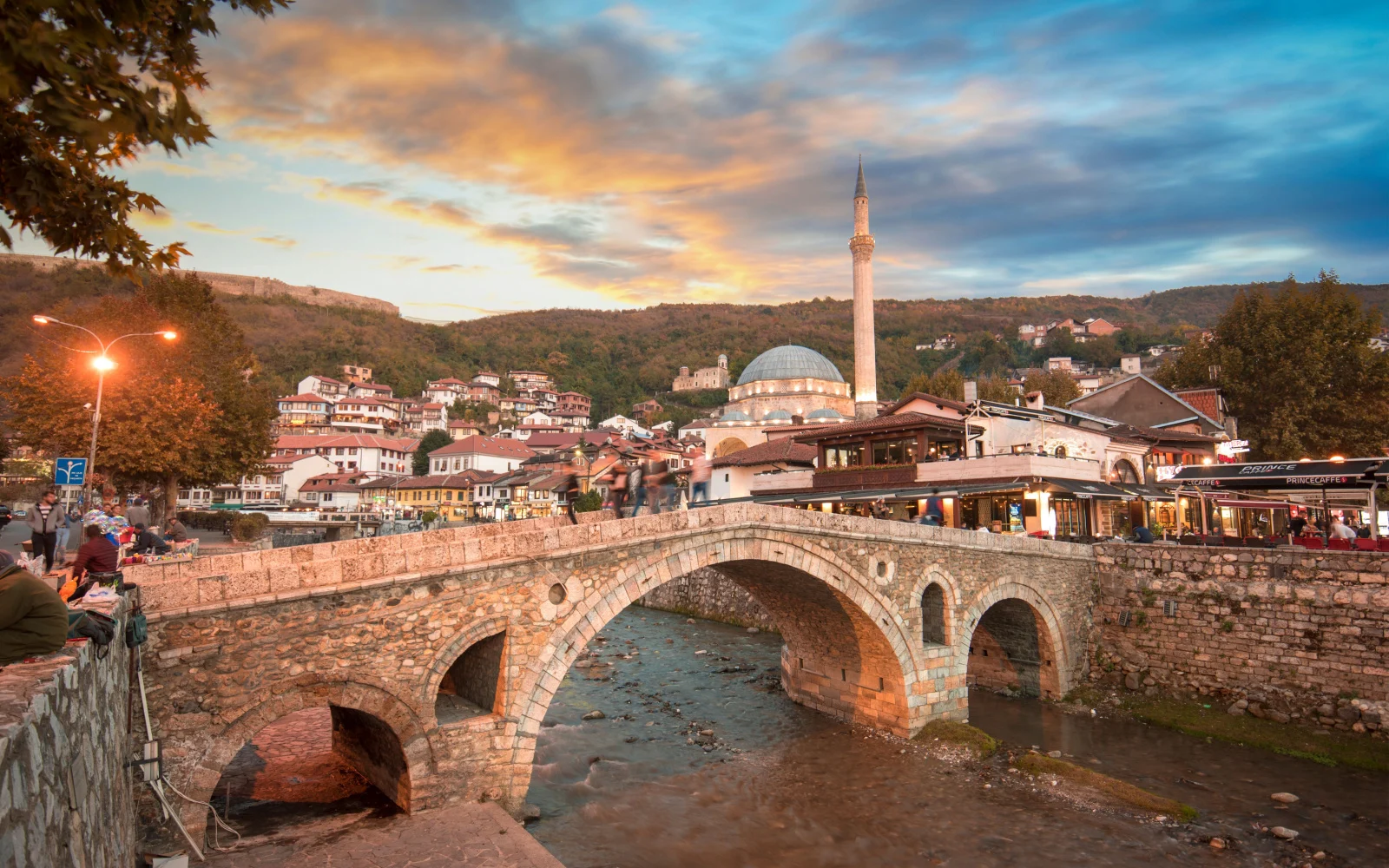Kosovo, Europe’s newest country, is attracting more and more travelers, especially those looking to get off the beaten path and go somewhere few other travelers have gone before.
Although Kosovo’s tourism industry is new, it is growing, with increasing international visitor arrivals. There are many things to see in the small country of Kosovo.
Visitors to the capital, Pristina, can check out the legacies of Yugoslav and Ottoman history, such as the famous National University Library of Kosovo and the thriving alternative scene.
But while it’s rich in history, culture, and unique sights to see, is Kosovo safe to visit? Don’t worry — we’ll break down all you need to know below.
Is Kosovo Safe to Visit in 2026?
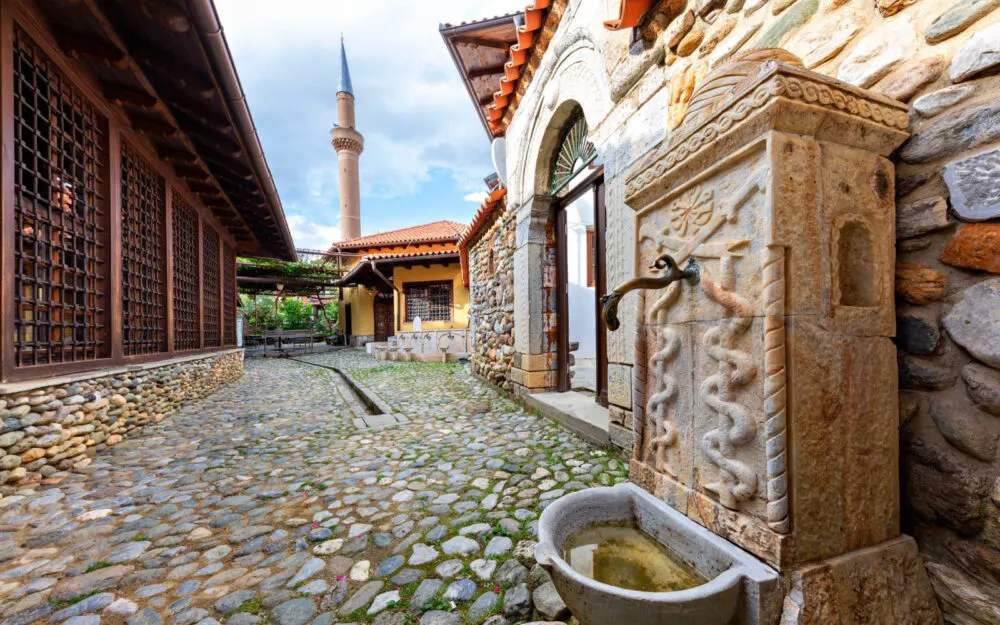
MehmetO/Shutterstock
For the most part, Kosovo is safe to visit. The country still has ethnic tensions left over from its brutal recent history, and demonstrations can turn violent at any moment, so you should be aware of the political situation before you go.
Kosovo does suffer from crime, but most violent crime affects members of organized crime groups, and tourists will only encounter petty incidents.
Most foreign governments advise their citizens to travel to Kosovo but encourage them to exercise caution when they go. For example, the United States State Department has Kosovo under a Level Two travel advisory.
New Zealand also advises its citizens to exercise increased caution in Kosovo and to avoid nonessential travel to certain areas.
The most common problems countries mention in their travel advisories are:
- Civil unrest
- Terrorism
- Ethnic tensions and politically motivated violence
- Petty crime
- Break-ins (residential and vehicle)
- Organized crime
- Fraud
To visit Kosovo, you need some background on the country’s recent history. Kosovo was part of Serbia for most of the 20th century and is the location of many sites from Serbian medieval history but is now majority Albanian.
In the 1980s, repression in Kosovo increased as Kosovar Albanians protested to be granted status as a full republic in Yugoslavia, not just as an autonomous part of Serbia.
After the break-up of Yugoslavia, the situation got even worse. Serbia’s dictator Slobodan Milošević imposed direct control over Kosovo and violently suppressed peaceful resistance, leading to armed Kosovar resistance.
The conflict between the Kosovo Liberation Army’s (KLA) guerrilla forces and Serbian troops lasted from 1998 until the NATO bombings of Serbia in 1999 and was characterized by brutality and reprisal killings.
The UN and international community brokered a ceasefire. After the war, Kosovo formally declared independence in 2008. However, this did not solve all of the country’s problems.
Serbia still does not recognize Kosovo’s independence and formally considers it just another province of Serbia, although de facto, it no longer has any control.
The international community is trying to broker a deal, but the situation has been stagnant for many years. Kosovo still has a sizable Serbian minority, mostly concentrated in the north of the country, which does not recognize the authority of the central government.
Tensions between the Serb minority and Albanian majority are omnipresent and sometimes break into outright conflict, for example, in 2022, when Serbs in the north erected barricades to protest a new law regulating ID documents.
If you travel to areas that have experienced this type of ethnic conflict in recent years, be aware that tensions could flare up at any moment. During most of your visit, you won’t be affected by the conflict as a foreigner.
However, being aware of the background can help you when you need to travel around the country and navigate bureaucratic headaches that other countries don’t have to experience (for example, at border crossings).
Crime in Kosovo
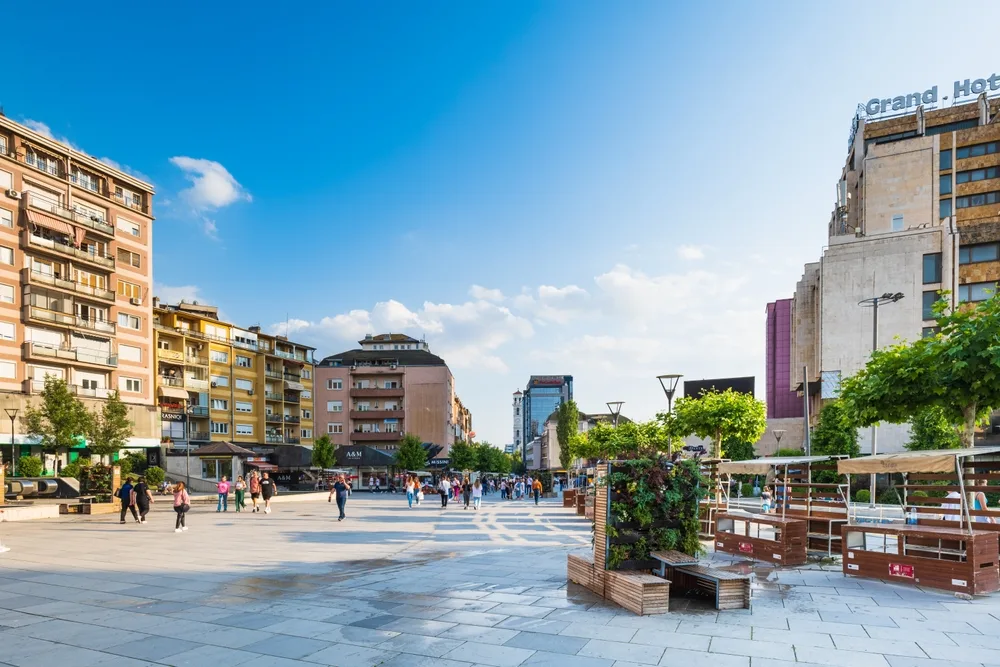
Pristina, Kosovo – June 2022: Pristina downtown street view in the center. Cityscape of the central area of Pristina, the capital of Kosovo/Uskarp/Shutterstock
Although you should be aware of Kosovo’s recent history and current political problems, those are less likely to affect your stay than crime.
Kosovo has a moderate crime rate, as befits a country that still has growing pains. Although the most likely problem you will encounter is petty theft, you might run into more violent crimes if you are in the wrong place at the wrong time.
The violent crime rate in Kosovo is moderate. According to World Bank data from 2018, the homicide rate is two incidents per 100,000 people.
The homicide rate has been steadily falling in the decade since independence, although rates of other violent crimes remain high. Many violent crime incidents are connected to organized crime.
According to a United Nations report, bribery and corruption are an omnipresent part of Kosovar society, creating the perfect conditions for criminals to operate.
According to the Marshall Center, Kosovo is an “organized crime haven” thanks to its weak institutions, destroyed existing institutions during its transition, and history of war.
Organized crime groups in Kosovo are involved in illegal trades such as human trafficking, money laundering, and drug smuggling (at one point, Kosovan mafia groups were behind a whopping 40% of the heroin that reached Europe and North America).
Most violent incidents that occur in Kosovo are part of gang wars or organized crime activities. While this means regular civilians are rarely targeted for such actions, you should avoid areas that are known to be high in organized criminal activity due to the risk of getting caught in the crossfire.
Property crime, including petty theft, is a much more prevalent problem. According to Numbeo, Kosovo scores a 41.55 on the overall crime index, which is a moderate value.
The crimes people worry about the most, besides corruption and bribery, are burglaries, vehicle break-ins, drug abuse, theft, and armed robbery.
Petty Theft
The most likely crime you will encounter, the same as you would on a journey to any place in the world, is petty theft. The Australian government warns that petty theft is common, especially in the form of pickpocketing and bag snatching.
Pickpockets operate in crowded areas and in places where they know they will run into foreign tourists since foreigners usually have fewer street smarts and more expensive valuables than local Kosovars.
The Australian travel advisory also lists common locations for pickpocketing, including the Pristina International Airport, markets, hotel lobbies, and on public transportation.
Pickpockets often operate in groups and will arrange themselves in a chain on a bus, with one person taking your wallet, then passing it down to the end so they don’t have your valuables on hand by the time you confront them.
Basic precautions are usually enough to deter Kosovar pickpockets. Keep your valuables in a secure place, such as an inner jacket pocket, front pants pocket, or zipped compartment of your bag.
Try not to take too many valuables with you when you’re out and about — only have enough cash on hand for the day and have a photocopy of your ID instead of the real deal.
Don’t let yourself get too distracted by Kosovo’s beauty so that you are not aware of your surroundings and don’t notice if someone seems far too interested in your bag.
You should be particularly careful around ATMs. Pickpockets often target foreigners after they leave ATMs since they know they will be carrying cash.
ATM fraud, such as card skimmers, is also common, so take precautions such as only using ATMs in secure locations and covering the keypad with your hand to prevent someone from seeing your PIN.
Break-Ins
Besides petty street crime, another common form of theft in Kosovo is the break-in. The UK government warns about the prevalence of vehicle break-ins.
Criminals often target luxury vehicles or four-wheel drives since they assume they belong to wealthy people. If you’re renting a car, make sure that the car is modest and doesn’t have many visible rental stickers.
Always park in a safe location and lock the doors. Don’t leave valuables in your vehicle, especially not in a visible location.
Residential break-ins are also common and can affect vacation homes, hotel rooms, or Airbnbs where tourists are staying, according to the Canadian government travel advisory.
Always ask your host about security when you are booking accommodations for Kosovo, including the crime statistics for the neighborhood. Be careful to lock the doors and close the windows in your accommodations whenever you leave for the day.
Avoiding Bad Areas
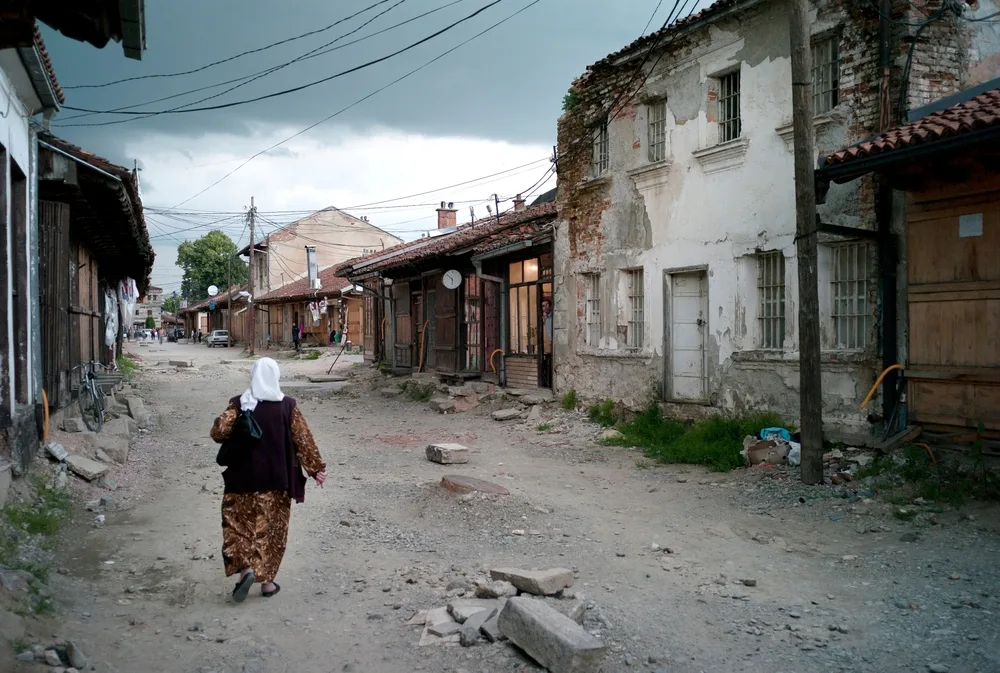
Pristina, Kosovo – 2013: Buildings and streets of Kosovo/Christopher Bobyn/Shutterstock
Being careful about where you travel in Kosovo can go a long way toward protecting you from any danger. Most countries advise their citizens not to travel to the north of Kosovo, including North Mitrovica, Leposavic, Zubin Potok, and Zvecan.
These municipalities are majority Serb and often experience ethnic tensions and violent civil unrest.
Be careful when traveling near the Serbian border, the Albanian border, in the mountains, and in the Dulje Pass. These areas still have a lot of uncleared landmines. Only stick to well-marked paths.
Things to Consider
Here are a few things to keep in mind during your visit to Kosovo:
- Montenegro, North Macedonia, and Albania all recognize Kosovo as an independent country, while Serbia does not. This creates issues at border crossings because the first three countries will stamp your passport as if it is any international border crossing, while Serbia does not, as it treats the Kosovo-Serbia border as an internal border. If you try to enter Serbia with a Kosovo passport stamp, you may be denied entry for entering at an “illegal” border crossing, so the safest bet is to exit Kosovo the same way you came.
- Celebratory gunfire is common on occasions such as weddings, so don’t be scared if you hear gunfire — just try not to get caught in the middle.
- While there haven’t been many recent terrorist attacks, there has been an increase in bomb threats, especially around intercity bus stations. Monitor local news before and during your stay.
Frequently Asked Questions
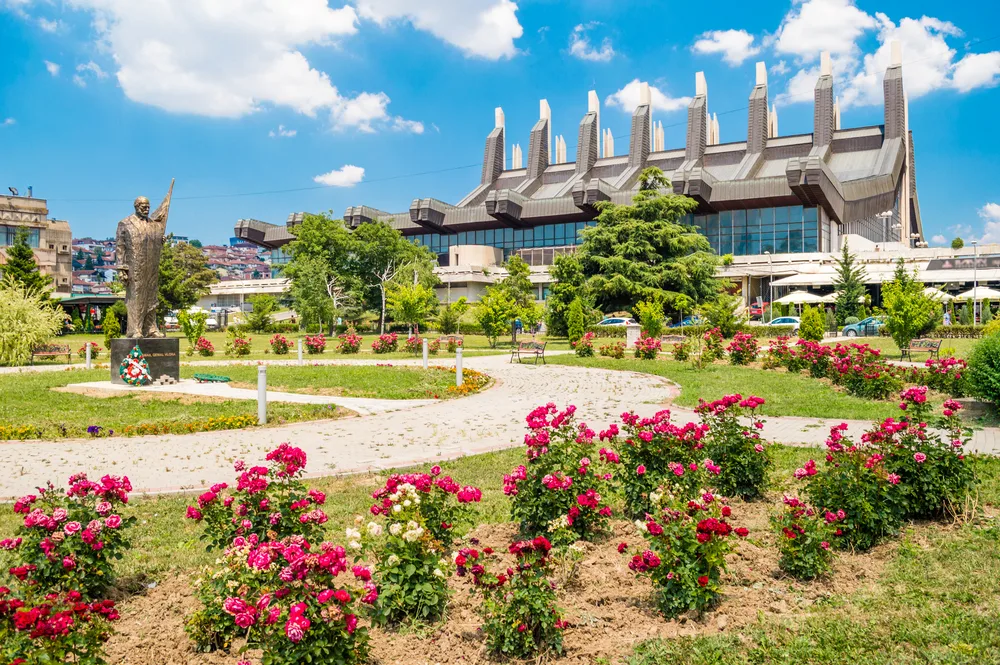
Andrii Lutsyk/Shutterstock
Here are some common questions that you might want to know before visiting Kosovo:
Is Kosovo good for tourists?
Kosovo is a better destination for an experienced traveler rather than a beginner tourist since the tourist infrastructure is still budding. There may not be that many attractions or choices of accommodations, but your experience visiting will certainly be unique.
Is Kosovo safe from Serbia?
Since the ceasefire of 1999, there hasn’t been any direct fighting between Kosovo and Serbia. Although Serbia blocks Kosovo in other ways, for example, by withholding diplomatic recognition, those actions are unlikely to affect tourists.
Is it safe to drive through Kosovo?
You should only drive through Kosovo if you are a safe, confident driver. The quality of roads is poor, especially outside of major cities, since rebuilding them hasn’t been a priority (or a possibility) for the cash-strapped government. Plus, Kosovar drivers tend to have a loose attitude toward safety.
Why do tourists visit Kosovo?
Although visiting Kosovo comes with its challenges, it is also very rewarding. Kosovo is at an interesting cultural crossroads, with medieval Orthodox remnants meeting traces of the Ottoman Empire. Plus, the culture is welcoming, the food is delicious, and the people are very interested in foreigners.
Is Kosovo safe for female travelers?
For the most part, Kosovo is safe for female travelers. However, you might experience street harassment, such as catcalling, which is unfortunately common in Balkan countries.
So, Is Kosovo Safe to Visit?
For the most part, Kosovo is safe to visit. Although the country had a tumultuous recent history and is still sorting out political issues stemming from its conflict with Serbia, most visits to Kosovo are trouble-free.
You should stay on top of local news and avoid areas that are known to have ethnic tensions, but besides that, the political situation shouldn’t affect you as a foreigner. Pickpockets are another story, so make sure you keep a firm grasp on your possessions.
In any case, you can visit Kosovo safely by taking the right precautions, but why risk it when they are so many other unique and historically-rich countries to visit? Whatever you decide to do, we wish you happy and safe travels!



